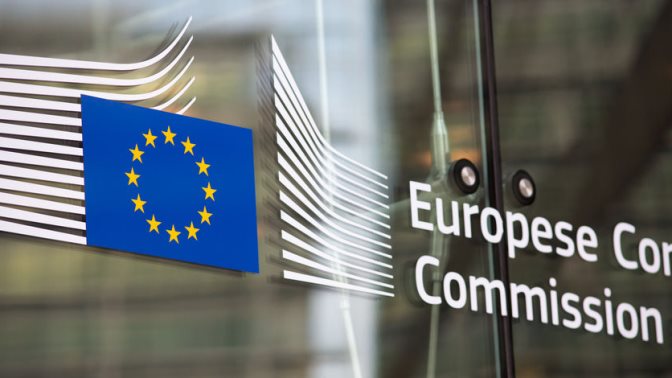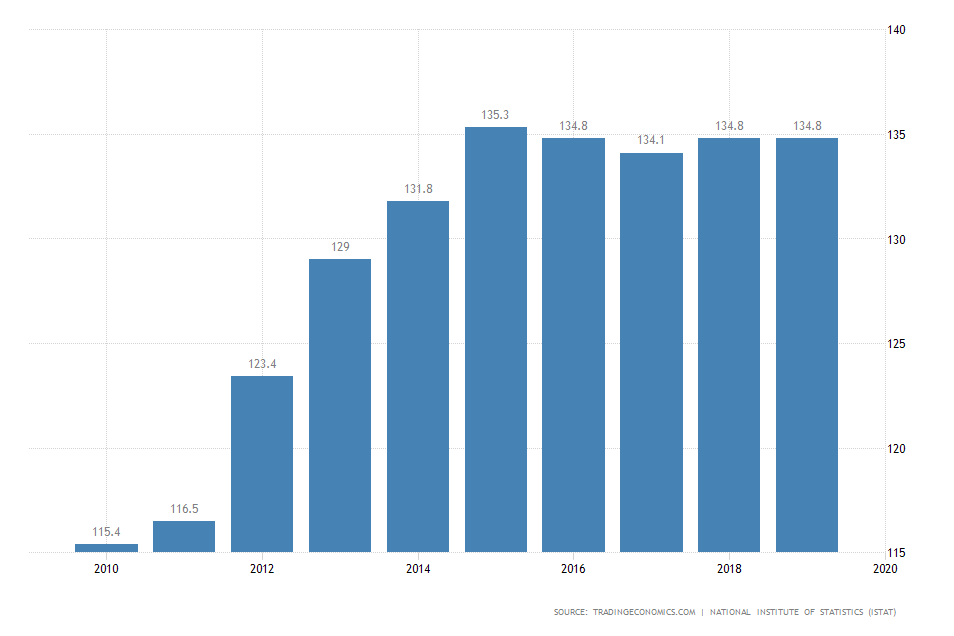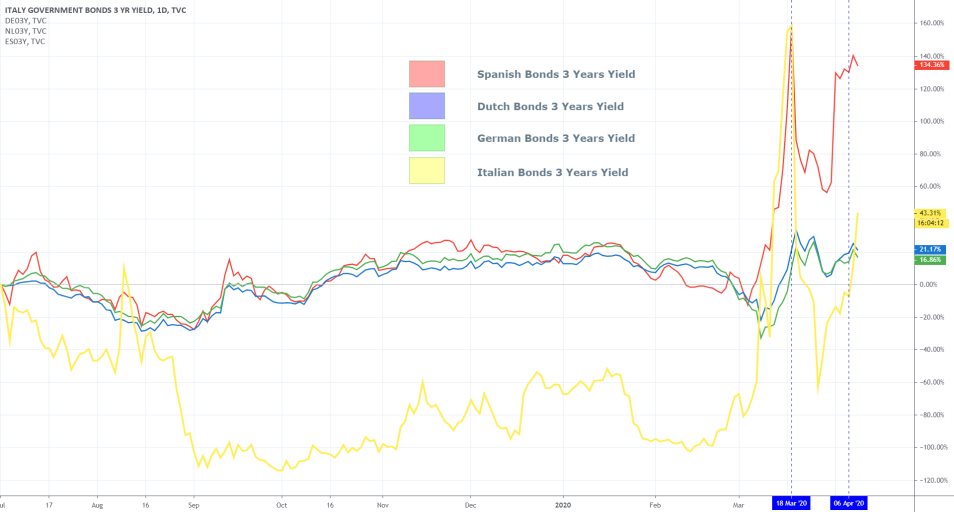
European Finance Ministers struggle to strike a chord over the proposed relief package for the reeling European economy as a result of the coronavirus fallout. A teleconference, which started on Tuesday evening, dragged until Wednesday morning, as the profound differences of opinions underlined a clear division between two camps.
Earlier in the week, the President of the European Council Charles Michel, the President of the European Commission Ursula von der Leyen, and the President of the ECB Christine Lagarde promised massive financial support coming in the near future.
"There is a lot of room for solidarity within the existing instruments and institutions. We have to exploit these tools fully and remain open to doing more. A strong package is in the making. Our goal is clear: we will protect European citizens and businesses from the economic impact of the pandemic."
Despite the shared optimism, however, an underlying rift between the Finance Ministers of poorer countries that have been hit harder by the epidemic and those of more affluent countries with more resilient financial systems became more apparent after the conference.
Spain and Italy insist the financial support that has been extended so far is insufficient. They require the issuing of joint European debt to mitigate the continually increasing impact of the economic fallout.
Sharing the debt between all member states is going to alleviate some of the financial strain that poorer countries were already feeling even before the crisis. Italy’s debt was running at 134 per cent of its GDP before the outbreak of COVID-19.

These numbers are certainly going to rise in the wake of the financial recovery that is going to take place after the epidemic is dealt with.
That is why the coronabonds are perceived in southern Europe as a balancing mechanism that is going to redistribute the financial burden of the recovery equally amongst all members of the bloc.
Meanwhile, the governments of countries like Germany and the Netherlands, which run a very tight fiscal budget, are opposed to the idea of issuing coronabonds. The ‘richer north’ perceives the proposition as an attempt of financially irresponsible countries to share the brunt of their outstanding debt with others.
The corona-crisis has exposed a geographic rift of opinions between the more prosperous north and the poorer south, which could have lasting effects for the EU's political landscape and its future cohesion.
If a mutually satisfactory agreement is reached soon, the European bonds market is likely to react to the news right away. The yields of short-term Spanish and Italian bonds are expected to jump on the much-needed financial alleviation.
The market already reacted in a likewise fashion when the ECB announced its stimulus bazooka in Mid-March.

Trendsharks Premium
Gold is undergoing a correction, as investors take profits to offset losses from falling stock prices, impacting their margins. However, we anticipate a renewed wave of [...]
The Swiss stock market index is mirroring its global counterparts, such as Germany 40 and US100, experiencing a sharp decline following the announcement of new [...]
We’re analyzing the weekly chart to grasp the broader market trend. Over the past three years, the US30 index has surged by 17,000 points, often resembling a nearly straight [...]
Over the past week, the DAX has experienced a sharp decline, plunging by an astonishing 3,400 points. This downward movement is not isolated, as its international counterparts, such as the UK100 and US100, are also facing significant [...]
EURUSD recently formed a double top at 1.0930, signaling a potential trend reversal, and has since begun a correction. After a 600-pip rally since early March, a pullback at this stage is both expected and healthy. Given these conditions, we are placing a [...]
Since early March, EURJPY has surged nearly 1,000 pips, providing us with several excellent trading opportunities. However, as the rally matures, many early buyers are beginning to take profits, leading to a noticeable slowdown in the uptrend. On Friday, the pair formed a [...]
The AUDJPY currency pair continues to be dominated by bullish momentum, as multiple golden cross patterns reaffirm the strength of the ongoing uptrend. Despite this, we are witnessing a much-needed [...]
The EURAUD currency pair appears to be undergoing a trend reversal, signaling a potential shift in market direction. A notable technical development is the formation of a Death Cross on the chart, a widely recognized bearish indicator that typically suggests a [...]
After securing an impressive 200-pip profit last week, the EURJPY currency pair is now undergoing a southward correction, retracing some of its recent gains. Despite this temporary pullback, the Golden Cross remains intact, reinforcing our view that the overall trend continues to be [...]
The appearance of a Golden Cross in Silver strengthens our analysis that the metal is currently in a strong uptrend, indicating further bullish momentum in the market. This technical pattern, where the short-term moving average crosses above the [...]
This trade presents a considerable level of risk and can be classified as an opportunistic move based on recent price action. The GBPUSD currency pair has experienced a substantial bullish rally, surging by nearly 500 pips in a strong upward movement. However, after this extended period of appreciation, the pair is showing signs of a potential [...]
The anticipated Death Cross on the SMI20 appears to be failing as price finds strong support at the 23% Fibonacci retracement level. After testing this area, the index has shown bullish strength, printing several large green candles, signaling an increase in [...]
A Golden Cross has just appeared on the USDJPY chart, signaling a potential bullish move. This technical pattern occurs when the 20 period moving average crosses above the 60 period moving average, a widely recognized indication of increasing [...]
After 2 months of a down trend, we finally see some indications of price recovery for Oil. The golden cross, a historic buy signal, supports this [...]
For the past month, the German DAX40 has experienced a remarkable 10% surge, reflecting strong bullish momentum. Despite ongoing market volatility and frequent pullbacks, every dip continues to attract fresh buyers, reinforcing the [...]
Oil continues its downward trajectory, despite occasional pullbacks. The overall trend remains bearish, reinforced by multiple Death Cross patterns, a classic sell signal indicating further weakness. Adding to this bearish outlook, the critical [...]
Over the past few days, gold has experienced a sharp decline of more than $100. This downturn can be attributed in part to traders securing profits to manage their margins, which are under strain due to the significant drop in major indices. Currently, gold has fallen below the [...]
The NASDAQ 100 index is showing strong bullish momentum, as evidenced by the formation of a Golden Cross on the chart. This classic buy signal occurs when the short moving average crosses above the long term moving average, suggesting that upward momentum is [...]
The EURAUD currency pair has encountered a significant resistance level, failing to break above the critical 61% Fibonacci retracement level. This suggests that bullish momentum is weakening, reinforcing the case for a potential downward move. Given this technical setup, we favor entering a [...]
The UK100 is experiencing a remarkable rally! Over the past few weeks, the British stock market index has surged nearly 800 points. Each minor dip has attracted more buyers, fueling the bullish momentum. However, since last week, we’ve observed a slight [...]




















